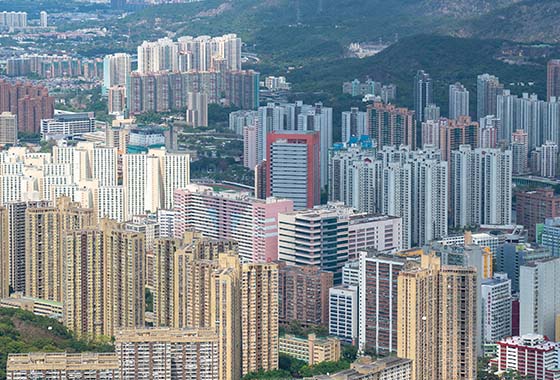Hong Kong land and housing supply must flow even in an economic downturn
This article appeared originally in South China Morning Post on 14 Feb, 2024.
Authors: Ryan Ip, Vice President and Co-Head of Research, Jason Leung, Head of Land and Housing Research, Andy Wong, Senior Manager, Advocacy at Our Hong Kong Foundation
Rather than be deterred by sluggish market sentiment, the government should adapt its approach to land creation and housing construction – by sequencing its development priorities, offering smaller land parcels, or turning more land over to building subsidised housing.

In the run-up to his budget speech this month, Financial Secretary Paul Chan Mo-po forecast a deficit of more than HK$110 billion for the 2023-24 financial year. Nevertheless, he reiterated the government’s commitment to land creation despite the recent fluctuations in the property market.
Market sentiment, however, remains sluggish. Under a land exchange offer, the government was in talks with the owners of six private sites in the Kwu Tung North and Fanling North new development areas, but no consensus was reached on the amount of the land premium by the deadline of December 31. The failure of the land swaps means that, rather than generating income through land premium payments, the government had to offer compensation to resume the land.
Responses to land tenders have been poor as well. Hong Kong saw a record six failed land tenders in 2023. With land sales down to a trickle and fiscal reserves drying up, there have been calls to defer or even scrap land development projects.
Hong Kong is at a crossroads again. The last time the city halted all land creation and slowed housing construction, the hiatus lasted 10 years and caused shortages and social problems that we are still grappling with today.
Learning from this experience, Hong Kong must press on with land creation and housing construction, but with a systematic approach that makes the most of our limited resources.
In terms of land supply, priority should be given to implementing planned land development projects such as the Kwu Tung North new development area, where an estimated six years is needed to produce spade-ready land. With the Kwu Tung MTR station scheduled for completion in 2027, any further delays in land resumption would mean falling further behind this milestone and creating a gap in the supply of spade-ready land.
The development sequence of the San Tin Technopole could also be rearranged. To make the most of limited resources and align with the railway construction schedule, priority should be given to developing the Lok Ma Chau Loop, followed by the adjacent Lok Ma Chau control point, and then San Tin town centre. With limited capacity in the existing road networks of the loop, the government could provide flexible cross-border facilities and roads as an interim solution to leverage the more mature ecosystem in Shenzhen.
In terms of housing supply, the suspension of residential land tenders should only be a temporary measure to avoid worsening demand-supply imbalances. A possible solution would be to divide the larger plots into smaller land parcels. This would reduce the investment lump sum, and associated costs and risks, making it more attractive and lowering the threshold for smaller developers to participate.
Nevertheless, there are also technical considerations involved. Such subdivisions could have an adverse impact on building views, accessibility and land-use efficiency.
Moreover, in the current environment where “cash is king”, the government remains caught in a passive position. Even if these plots are successfully subdivided and tendered, they would not generate as much revenue as in the past.
To avoid unsuccessful tenders causing a housing supply chasm, the government should also consider allocating the sites for subsidised housing.
In fact, there is already a precedent for such an arrangement: following the failed tender of a Tsuen Wan site last August, the government invited the Housing Society to take over the site for development of starter homes. Other public housing providers such as the Housing Authority and Urban Renewal Authority could also be called on if needed.
This approach would offer a number of benefits. First, it would ensure a stable housing supply without directly affecting the private property market.
Second, it would foster a more diverse affordable housing market that facilitates home ownership, improving social mobility in society. In particular, it would give public housing tenants more opportunities to own their home.
Third, it would provide replacement units for tenants affected by urban redevelopment.
Fiscal deficits are common during economic slowdowns, but this does not mean we have to hit the panic button. As long as Hong Kong takes a systematic approach to make full use of its limited resources, we can maximise efficiency and give ourselves a good base for future growth.



